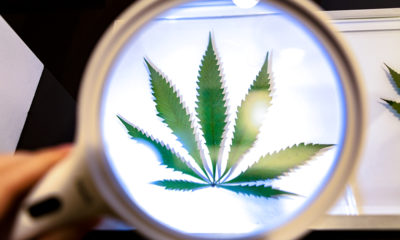
Medical
The Doctor Synonymous with THC Research Forges Onward
Zack Klein and Professor Raphael Mechoulam have joined together in creating a film to emphasize the importance of the endocannabinoid system.
Zach Klein, the documentarian behind the film “The Scientist,” is a multifaceted individual. Klein was working in Israeli TV, specifically Israeli Sesame Street, while also pursuing a degree in environmental studies when his mother received a dire diagnosis. It was this diagnosis that lead him to examine medical cannabis, eventually establishing both a friendship and working relationship with the Israeli biochemist who, among other achievements, discovered THC in 1964.
Now, both Klein and the man known as the grandfather of medical cannabis research, Professor Raphael Mechoulam, have joined together in creating a film to emphasize the importance of the endocannabinoid system, a mechanism that scientists stateside have speculated may have therapeutic potential to treat all human diseases.
“Thirty-five years ago we published a small clinical trial on epilepsy in collaboration with a Brazilian group,” Mechoulam told Cannabis Now. “We isolated from hashish, which was given to us by the police incidentally. We isolated a certain amount of cannabidiol (CBD) and sent it to our Brazilian colleagues who tested it. They tested it on patients. We had 15 patients, half of them were controls – half of them got CBD large doses and so we had eight patients that got the cannabidiol – four of them did not have any seizures any more for the three months that we gave them the material. Three of them had very, very few and one continued to have seizures… Well, this work that was published 35 years ago was never continued. Only now because parents have found that cannabidiol helps their children, only now have clinical trials started. Did we have to wait for 35 years? No, we didn’t. The data was there.”
The recent push for CBD-only laws in the United States has been driven by parents across the nation, many of whom watched a mainstream television program hosted by CNN’s Dr. Sanjay Gupta. Since the “Weed” special first aired in the summer of 2013, 14 states have adopted laws allowing for the use of CBD. Klein and Mechoulam are hopeful their new film may produce a similar effect worldwide.
“I think cannabis will make, I don’t want to say it loud, but a revolution in medicine,” Klein says.
Klein began his own investigation into the therapeutic effects of cannabis when his mother was diagnosed with cancer in 2000.
“I encountered the story of medical cannabis when my mother was diagnosed with cancer and her physician actually told her – secretly told her – to find cannabis, to find hashish,” he said.
While medical cannabis was approved by the Israeli Ministry of Health in 1992, it wasn’t until 2007 that a formal system was put in place to provide the medicine to patients. Today the Ministry of Health provides medical cannabis to about 22,000 people, but Klein said at the time of his mother’s diagnosis, while the scientific information was available, little was known about the effects of cannabis in human trials.
When his mother expressed concerns about potential brain damage associated with medical marijuana, Klein attended a lecture lead by Mechoulam, who in 2000 had just won the Israel Prize for his achievements in chemistry. Mechoulam elucidated the structure of CBD in 1963, isolated and described Tetrahydrocannabinol (THC) in 1964 and was a part of the team that went on to discover the first endogenous cannabinoid, anandamide – one produced by the human body that binds to the same receptors in the brain as the compounds present in cannabis – in 1996. In the lecture, he also directly addressed the concern voiced by Klein’s mother, revealing that cannabis doesn’t cause brain damage, but rather, has neuroprotective qualities.
“Everything regarding cannabinoids was amazing,” Klein said of the lecture, relating that information that he learned in the hour-long discussion became the basis for “The Scientist.”
But, before he could create a documentary centered on the life of Mechoulam, his mentor instructed him to make a film about cannabis in Israel. That film, “Prescribed Grass,” was released in 2009 and follows several Israeli patients receiving cannabis as a treatment for life-threatening diseases. While working on the film, Klein was simultaneously earning a master’s degree that included cannabis research at a nursing home and acting as a media liaison for what would become the first of Israel’s eight sanctified cannabis growing facilities, Tikun Olam.
“After I started doing my master’s degree in university and doing research and doing a project in the nursing home with cannabis and presenting it to Professor Mechoulam, after all this, when he saw that I’m very serious about cannabis we agreed that I would make the documentary about him,” he says.
Klein had invited Mechoulam to join him at the nursing home where he was conducting his research, putting the scientist face-to-face with human patients receiving cannabis as treatment.
“He met real people, real patients that use cannabis, not mice,” Klein says of the time the professor spent with him at the facility, footage of which appears in both films.
As shown in “The Scientist,” Mechoulam’s research often absorbs lessons from the past to drive modern cannabinoid research ever-forward. The documentary depicts an ancient text from the 15th century in which cannabis was used as a treatment for epilepsy.
“Quite a lot of other things are known,” Mechoulam said. “The Greeks and the Romans knew a lot about inflammation… There’s a lot of other things that have been reported in past literature, but today we are a little bit, well, modern in a bad sense. We only look at what can be found on the internet and do not go back and look at quite a lot of other things. For example, the Egyptians mention in one of their very, very old things that it was used as a drug in mothers and children. Most probably, it had to do with the pain during giving birth, probably… So, we should be looking at old literature or the things that people report today. For example, we’re not sure how cannabinoids work on migraines. Queen Victoria, 130 years ago, was given cannabis for her migraines. So, there is a lot in historical literature. There’s also anecdotal views. People come around and tell me all kinds of things that cannabis may have helped them, but there is no clinical work. I have to stress, up until now there is very little real clinical work.”
Klein hopes his film will facilitate the clinical trials needed to push cannabinoid therapy onto the forefront of medical research and he’s already at work on another documentary. The 47-year-old has also just started his Ph.D centering on the medical ethics involving cannabis. While Israel is actually providing cannabis to patients, Klein is focused on bureaucratic hurdles that continue to prevent access to the medication. For example, the Ministry of Heath decides how much cannabis a patient can receive and could make a choice to cut the amount provided.
“That’s not a medical decision, that’s a bureaucratic decision,” he says. “The patient has to fight and it’s impossible for them to fight.”
Now in his 80s, Mechoulam continues to make new discoveries in cannabinoid science. He is currently working with a team discovering developments for the therapeutic use of CBD for bones.
“We just found that we can help broken bones with CBD and the bones are repaired much faster if CBD is administered,” he says. “So here we have a major pharmacological system of considerable importance.”
The scientist also remains in the lab in an effort to improve the effectiveness of CBD, a cannabinoid that, unlike THC, does not cause psychoactivity.
“Cannabidiol is an excellent compound, but the doses needed, sometimes are very high, so we’re trying to see whether we can get more potent compounds,” he says. “For schizophrenia, we don’t want to give 800 milligrams a day, which is a huge amount, maybe we can have something that works better.”
Whether the future of cannabinoid-based medication is isolated cannabinoids mixed together in a lab or whole-plant extracts grown to have precise cannabinoid ratios, Mechoulam says it will depend on the condition that is being treated.
“Cannabidiol, as such, is probably good enough for epilepsy,” he says. “Probably is as such, without any additional things, good for quite a few other things. It has been shown to be good in schizophrenia. But, there is a lot of common knowledge that stresses that THC, for example, is not very effective for some things, but much more effective when it has the additional compounds.”
THC, he says, is not a very valuable drug and, in its synthetic form as Marinol, is available in the U.S., but not widely prescribed.
“Probably because it is better to use it together with some of the compounds that are found in cannabis,” he says. “We showed that, experimentally, we called it the entourage effect. And unfortunately, it has not been well investigated. Certainly not in human trials. Not a single human trial on the entourage effect. So, here we have something that a lot of people claim, probably correctly, that medical cannabis or at least some medical cannabis strains are better with the terpenes and so on that’s found there, but we still need a clinical trial. There’s no clinical trials at this point, which is a shame.”





















